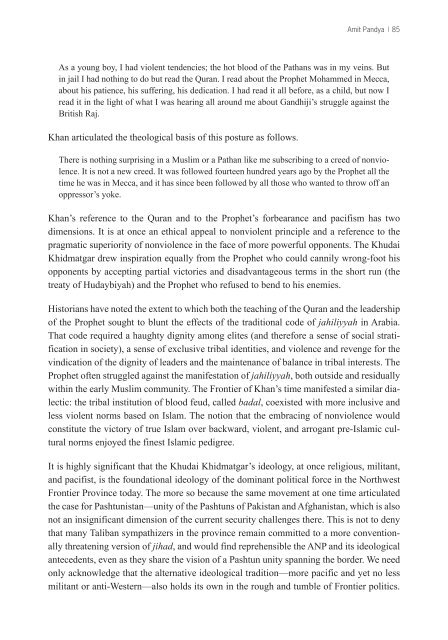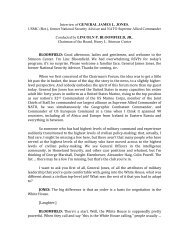Islam and Politics - The Stimson Center
Islam and Politics - The Stimson Center
Islam and Politics - The Stimson Center
You also want an ePaper? Increase the reach of your titles
YUMPU automatically turns print PDFs into web optimized ePapers that Google loves.
Amit P<strong>and</strong>ya | 85<br />
As a young boy, I had violent tendencies; the hot blood of the Pathans was in my veins. But<br />
in jail I had nothing to do but read the Quran. I read about the Prophet Mohammed in Mecca,<br />
about his patience, his suffering, his dedication. I had read it all before, as a child, but now I<br />
read it in the light of what I was hearing all around me about G<strong>and</strong>hiji’s struggle against the<br />
British Raj.<br />
Khan articulated the theological basis of this posture as follows.<br />
<strong>The</strong>re is nothing surprising in a Muslim or a Pathan like me subscribing to a creed of nonviolence.<br />
It is not a new creed. It was followed fourteen hundred years ago by the Prophet all the<br />
time he was in Mecca, <strong>and</strong> it has since been followed by all those who wanted to throw off an<br />
oppressor’s yoke.<br />
Khan’s reference to the Quran <strong>and</strong> to the Prophet’s forbearance <strong>and</strong> pacifism has two<br />
dimensions. It is at once an ethical appeal to nonviolent principle <strong>and</strong> a reference to the<br />
pragmatic superiority of nonviolence in the face of more powerful opponents. <strong>The</strong> Khudai<br />
Khidmatgar drew inspiration equally from the Prophet who could cannily wrong-foot his<br />
opponents by accepting partial victories <strong>and</strong> disadvantageous terms in the short run (the<br />
treaty of Hudaybiyah) <strong>and</strong> the Prophet who refused to bend to his enemies.<br />
Historians have noted the extent to which both the teaching of the Quran <strong>and</strong> the leadership<br />
of the Prophet sought to blunt the effects of the traditional code of jahiliyyah in Arabia.<br />
That code required a haughty dignity among elites (<strong>and</strong> therefore a sense of social stratification<br />
in society), a sense of exclusive tribal identities, <strong>and</strong> violence <strong>and</strong> revenge for the<br />
vindication of the dignity of leaders <strong>and</strong> the maintenance of balance in tribal interests. <strong>The</strong><br />
Prophet often struggled against the manifestation of jahiliyyah, both outside <strong>and</strong> residually<br />
within the early Muslim community. <strong>The</strong> Frontier of Khan’s time manifested a similar dialectic:<br />
the tribal institution of blood feud, called badal, coexisted with more inclusive <strong>and</strong><br />
less violent norms based on <strong>Islam</strong>. <strong>The</strong> notion that the embracing of nonviolence would<br />
constitute the victory of true <strong>Islam</strong> over backward, violent, <strong>and</strong> arrogant pre-<strong>Islam</strong>ic cultural<br />
norms enjoyed the finest <strong>Islam</strong>ic pedigree.<br />
It is highly significant that the Khudai Khidmatgar’s ideology, at once religious, militant,<br />
<strong>and</strong> pacifist, is the foundational ideology of the dominant political force in the Northwest<br />
Frontier Province today. <strong>The</strong> more so because the same movement at one time articulated<br />
the case for Pashtunistan—unity of the Pashtuns of Pakistan <strong>and</strong> Afghanistan, which is also<br />
not an insignificant dimension of the current security challenges there. This is not to deny<br />
that many Taliban sympathizers in the province remain committed to a more conventionally<br />
threatening version of jihad, <strong>and</strong> would find reprehensible the ANP <strong>and</strong> its ideological<br />
antecedents, even as they share the vision of a Pashtun unity spanning the border. We need<br />
only acknowledge that the alternative ideological tradition—more pacific <strong>and</strong> yet no less<br />
militant or anti-Western—also holds its own in the rough <strong>and</strong> tumble of Frontier politics.

















